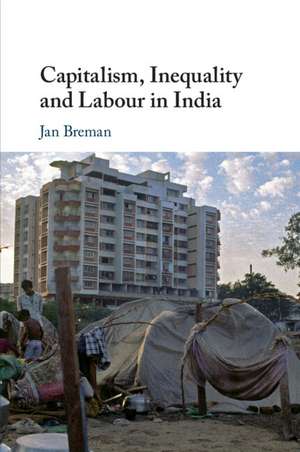Capitalism, Inequality and Labour in India
Autor Jan Bremanen Limba Engleză Paperback – 19 oct 2022
| Toate formatele și edițiile | Preț | Express |
|---|---|---|
| Paperback (1) | 224.06 lei 6-8 săpt. | |
| Cambridge University Press – 19 oct 2022 | 224.06 lei 6-8 săpt. | |
| Hardback (1) | 627.20 lei 3-5 săpt. | +23.81 lei 7-13 zile |
| Cambridge University Press – 14 aug 2019 | 627.20 lei 3-5 săpt. | +23.81 lei 7-13 zile |
Preț: 224.06 lei
Nou
Puncte Express: 336
Preț estimativ în valută:
42.87€ • 44.76$ • 35.48£
42.87€ • 44.76$ • 35.48£
Carte tipărită la comandă
Livrare economică 04-18 aprilie
Preluare comenzi: 021 569.72.76
Specificații
ISBN-13: 9781108712279
ISBN-10: 1108712274
Pagini: 300
Ilustrații: 12 b/w illus.
Dimensiuni: 151 x 228 x 16 mm
Greutate: 0.4 kg
Editura: Cambridge University Press
Colecția Cambridge University Press
Locul publicării:Cambridge, United Kingdom
ISBN-10: 1108712274
Pagini: 300
Ilustrații: 12 b/w illus.
Dimensiuni: 151 x 228 x 16 mm
Greutate: 0.4 kg
Editura: Cambridge University Press
Colecția Cambridge University Press
Locul publicării:Cambridge, United Kingdom
Cuprins
Part I. Labour as Codified in Annals of the State: 1. The country liberated; 2. An end to servitude?; Part II. Constrained in Decrepitude: 3. The commodification of agricultural labour; 4. The class struggle launched and suppressed; 5. The Gandhian road to inclusion; Part III. The Political Economy of Boundless Dispossession: 6. The Agrarian Question posed as the social question; 7. Labour migration: going off and coming back; 8. Indebtedness as labour attachment; Part IV. Conclusion: 9. Capitalism, labour bondage and the social question.
Recenzii
'From Jan Breman's lifetime of research with labour in Gujarat have come original concepts of patronage and exploitation, circular migration, footloose labour, neo-bondage, exclusion and expulsion from social rights and habitat - all now essential to our understanding of India's labour-force. In this tour-de-force, Breman synthesises the history of coercive debt, bondage and servitude, tracing its persistence from colonial roots to the present where tied and contingent labour underpins capitalism with Indian characteristics. Shabash.' Barbara Harriss-White, Emeritus Professor, University of Oxford
'A masterful summing up of the six decades-long research of Jan Breman in and on India. The deep changes in the mode and manner of social exploitation and the failed promises of a sovereign state have been pursued by the author with a relentless critique of India's capitalist path while retaining a deep empathy for the labouring poor.' K. P. Kannan, Centre for Development Studies, Trivandrum
'In sum, this book makes some valuable points about the capitalist nature of progressive inequality.' A. A. Batabyal, Choice
'… Jan Breman's work will certainly stand the test of time not only as evidence to the sufferings and fights of the dispossessed laboring, but also as an exercise in academic excellence, fueled by empathy that ultimately generated profound and intricate scholarly insights.' Nikolay Kamenov, H-Soz-Kult
'A masterful summing up of the six decades-long research of Jan Breman in and on India. The deep changes in the mode and manner of social exploitation and the failed promises of a sovereign state have been pursued by the author with a relentless critique of India's capitalist path while retaining a deep empathy for the labouring poor.' K. P. Kannan, Centre for Development Studies, Trivandrum
'In sum, this book makes some valuable points about the capitalist nature of progressive inequality.' A. A. Batabyal, Choice
'… Jan Breman's work will certainly stand the test of time not only as evidence to the sufferings and fights of the dispossessed laboring, but also as an exercise in academic excellence, fueled by empathy that ultimately generated profound and intricate scholarly insights.' Nikolay Kamenov, H-Soz-Kult
Notă biografică
Descriere
Breman takes dispossession as his central theme in this ambitious analysis of labour bondage in India's changing political economy.
